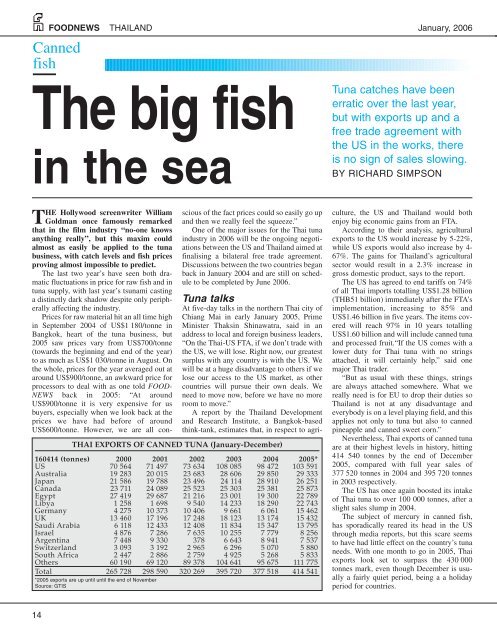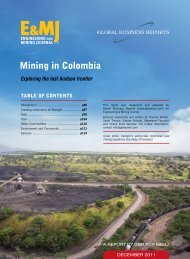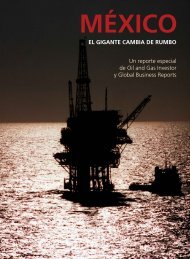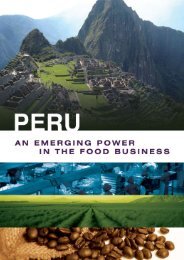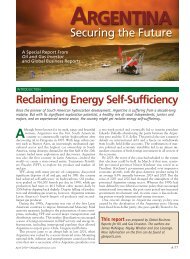Create successful ePaper yourself
Turn your PDF publications into a flip-book with our unique Google optimized e-Paper software.
FOODNEWS THAILAND January, <strong>2006</strong><br />
Canned<br />
fish<br />
The big fish<br />
Tuna<br />
in the sea<br />
catches have been<br />
erratic over the last year,<br />
but with exports up and a<br />
free trade agreement with<br />
the US in the works, there<br />
is no sign of sales slowing.<br />
BY RICHARD SIMPSON<br />
THE Hollywood screenwriter William<br />
Goldman once famously remarked<br />
that in the film industry “no-one knows<br />
anything really”, but this maxim could<br />
almost as easily be applied to the tuna<br />
business, with catch levels and fish prices<br />
proving almost impossible to predict.<br />
The last two year’s have seen both dramatic<br />
fluctuations in price for raw fish and in<br />
tuna supply, with last year’s tsunami casting<br />
a distinctly dark shadow despite only peripherally<br />
affecting the industry.<br />
Prices for raw material hit an all time high<br />
in September 2004 of US$1 180/tonne in<br />
Bangkok, heart of the tuna business, but<br />
2005 saw prices vary from US$700/tonne<br />
(towards the beginning and end of the year)<br />
to as much as US$1 030/tonne in August. On<br />
the whole, prices for the year averaged out at<br />
around US$900/tonne, an awkward price for<br />
processors to deal with as one told FOOD-<br />
NEWS back in 2005: “At around<br />
US$900/tonne it is very expensive for us<br />
buyers, especially when we look back at the<br />
prices we have had before of around<br />
US$600/tonne. However, we are all conscious<br />
of the fact prices could so easily go up<br />
and then we really feel the squeeze.”<br />
One of the major issues for the Thai tuna<br />
industry in <strong>2006</strong> will be the ongoing negotiations<br />
between the US and <strong>Thailand</strong> aimed at<br />
finalising a bilateral free trade agreement.<br />
Discussions between the two countries began<br />
back in January 2004 and are still on schedule<br />
to be completed by June <strong>2006</strong>.<br />
THAI EXPORTS OF CANNED TUNA (January-December)<br />
160414 (tonnes) 2000 2001 2002 2003 2004 2005*<br />
US 70 564 71 497 73 634 108 085 98 472 103 591<br />
Australia 19 283 20 015 23 683 28 606 29 850 29 333<br />
Japan 21 586 19 788 23 496 24 114 28 910 26 251<br />
Canada 23 711 24 089 25 523 25 303 25 381 25 873<br />
Egypt 27 419 29 687 21 216 23 001 19 300 22 789<br />
Libya 1 258 1 698 9 540 14 233 18 290 22 743<br />
Germany 4 275 10 373 10 406 9 661 6 061 15 462<br />
UK 13 460 17 196 17 248 18 123 13 174 15 432<br />
Saudi Arabia 6 118 12 433 12 408 11 834 15 347 13 795<br />
Israel 4 876 7 286 7 635 10 255 7 779 8 256<br />
Argentina 7 448 9 330 378 6 643 8 941 7 537<br />
Switzerland 3 093 3 192 2 965 6 296 5 070 5 880<br />
South Africa 2 447 2 886 2 759 4 925 5 268 5 833<br />
Others 60 190 69 120 89 378 104 641 95 675 111 775<br />
Total 265 728 298 590 320 269 395 720 377 518 414 541<br />
*2005 exports are up until until the end of November<br />
Source: GTIS<br />
Tuna talks<br />
At five-day talks in the northern Thai city of<br />
Chiang Mai in early January 2005, Prime<br />
Minister Thaksin Shinawatra, said in an<br />
address to local and foreign business leaders,<br />
“On the Thai-US FTA, if we don’t trade with<br />
the US, we will lose. Right now, our greatest<br />
surplus with any country is with the US. We<br />
will be at a huge disadvantage to others if we<br />
lose our access to the US market, as other<br />
countries will pursue their own deals. We<br />
need to move now, before we have no more<br />
room to move.”<br />
A report by the <strong>Thailand</strong> Development<br />
and Research Institute, a Bangkok-based<br />
think-tank, estimates that, in respect to agriculture,<br />
the US and <strong>Thailand</strong> would both<br />
enjoy big economic gains from an FTA.<br />
According to their analysis, agricultural<br />
exports to the US would increase by 5-22%,<br />
while US exports would also increase by 4-<br />
67%. The gains for <strong>Thailand</strong>’s agricultural<br />
sector would result in a 2.3% increase in<br />
gross domestic product, says to the report.<br />
The US has agreed to end tariffs on 74%<br />
of all Thai imports totalling US$1.28 billion<br />
(THB51 billion) immediately after the FTA’s<br />
implementation, increasing to 85% and<br />
US$1.46 billion in five years. The items covered<br />
will reach 97% in 10 years totalling<br />
US$1.60 billion and will include canned tuna<br />
and processed fruit.“If the US comes with a<br />
lower duty for Thai tuna with no strings<br />
attached, it will certainly help,” said one<br />
major Thai trader.<br />
“But as usual with these things, strings<br />
are always attached somewhere. What we<br />
really need is for EU to drop their duties so<br />
<strong>Thailand</strong> is not at any disadvantage and<br />
everybody is on a level playing field, and this<br />
applies not only to tuna but also to canned<br />
pineapple and canned sweet corn.”<br />
Nevertheless, Thai exports of canned tuna<br />
are at their highest levels in history, hitting<br />
414 540 tonnes by the end of December<br />
2005, compared with full year sales of<br />
377 520 tonnes in 2004 and 395 720 tonnes<br />
in 2003 respectively.<br />
The US has once again boosted its intake<br />
of Thai tuna to over 100 000 tonnes, after a<br />
slight sales slump in 2004.<br />
The subject of mercury in canned fish,<br />
has sporadically reared its head in the US<br />
through media reports, but this scare seems<br />
to have had little effect on the country’s tuna<br />
needs. With one month to go in 2005, Thai<br />
exports look set to surpass the 430 000<br />
tonnes mark, even though December is usually<br />
a fairly quiet period, being a a holiday<br />
period for countries.<br />
14


